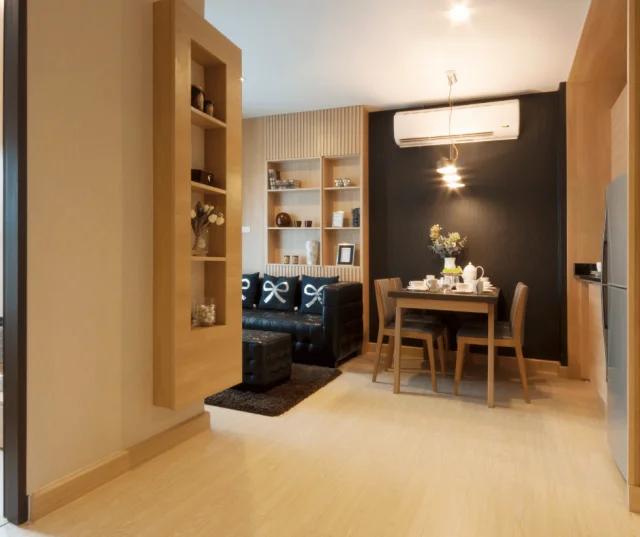What is Condominium: An Ultimate Guide for Homebuyers
When it comes to home buying, the term “condominium” often floats around, leaving many potential buyers intrigued and sometimes confused. If you’re on the journey to find your dream home, understanding what is condominium can be crucial. In this comprehensive blog, we’ll unravel the mysteries of condominiums.
We will be exploring their definition, advantages, potential drawbacks, and why they might be the perfect fit for your real estate aspirations.
Also Read: Apartment vs Condomnium
Unlocking the Essence of Condominium Living
In real estate, the term “condominium” often graces property discussions. But what exactly does it entail, and why is it becoming an increasingly popular choice for homeowners? If you find yourself intrigued by this housing option or perhaps confused about what it entails, fear not.
This informative guide, brought to you by Propex, delves into the heart of condominium living. We will unravel its layers, benefits, and why it might be the ideal housing solution.
Understanding Condominiums: Breaking Down the Basics
A condominium, commonly known as a condo, is a unique form of housing where individuals own their units within a larger complex or building. While homeowners own their units, common areas such as lobbies, hallways, elevators, and amenities are collectively owned and maintained by all residents through their association. This distinctive ownership structure sets condominiums apart from traditional single-family homes or apartments.
What is Condominium? A condominium, in essence, is a residential setup where homeowners own their units while sharing ownership and responsibility for common areas with other residents.
The Condominium Lifestyle: A Fusion of Privacy and Community
One of the primary draws of condominium living is the balance between privacy and community. Residents relish the autonomy of their private living spaces while also enjoying shared amenities and a sense of community facilitated by the proximity of neighbours. This unique blend caters to individuals seeking a more communal living experience without compromising personal space.
Living in a Condo: Condominium living provides residents with a harmonious blend of privacy and a sense of community fostered by shared spaces and amenities.
Unique Ownership Structure
Individual Ownership
- In a condominium, you own your living space, ranging from an apartment-style unit to a townhouse or even a detached house within the complex. This individual ownership grants you the right to sell, mortgage, or lease your unit.
Shared Ownership
- Simultaneously, condo residents collectively own and share common areas such as hallways, elevators, recreational facilities, and outdoor spaces. A condominium association typically manages the responsibility for maintaining these shared spaces.
Also Read: What is Rental Yield Calculator
The Condominium Association
Role of Condominium Association
A key feature of condominium living is a condominium association, often elected by unit owners. This association is responsible for managing the property’s common areas. This enforces rules and regulations and collects fees (commonly known as condo fees) to cover maintenance costs.
Decision-Making Process
Condo owners usually have a say in decisions that impact the entire community. This can include budget approvals, common area rule changes, and association board members’ elections.
What is Condominium Living Pros and Cons: Weighing Your Options
As with any housing choice, condominium living comes with its set of advantages and considerations. Let’s explore the pros and cons, allowing you to make an informed decision based on your lifestyle, preferences, and priorities.
Pros of Condominium Living:
- Low Maintenance: The association typically handles Exterior maintenance and landscaping, freeing residents from these responsibilities.
- Amenities: Access to shared amenities such as pools, gyms, and communal spaces without the burden of individual maintenance.
- Community Atmosphere: A sense of community with close neighbours and shared spaces, fostering social interactions.
Cons of Condominium Living:
- Association Fees: Monthly fees to the association cover maintenance but add to living costs.
- Less Privacy: Proximity to neighbours and shared spaces may result in less privacy compared to a detached home.
- Rule Adherence: Residents need to abide by community rules set by the association.
Considering Condominium Living: Reflect on the pros and cons to determine if condominium living aligns with your lifestyle, preferences, and priorities.
Navigating Condominium Ownership: What to Consider
- Association Fees: Understand the monthly association fees and what they cover. These fees contribute to the upkeep of common areas, building maintenance, and amenities.
- Rules and Regulations: Each condominium community operates under specific rules and regulations the Condominium Association sets. Familiarize yourself with these guidelines to ensure they align with your lifestyle.
- Reserve Fund: A well-managed condominium will have a reserve fund for major repairs and unforeseen expenses. Inquire about the financial health of the Condominium Association.
- Community Dynamics: Consider the atmosphere and community dynamics within the condominium. Attend association meetings and engage with residents to get a feel for the living experience.
- Resale Value: Assess the resale value of units in the condominium. A well-maintained and efficiently managed property tends to have a higher resale value.
- Legal Aspects: Seek legal advice before finalizing any condominium purchase. Understand the legal framework, association bylaws, and any ongoing legal issues related to the property.
Is Condominium Living Right for You?
Now that we’ve explored the key aspects of what is condominium living, the question arises: Is it the right choice for you? The answer depends on your lifestyle, preferences, and long-term goals. Here are some considerations:
- Lifestyle: If you appreciate shared amenities, a sense of community, and reduced maintenance responsibilities, a condominium might align with your lifestyle.
- Financial Considerations: Condominiums often offer a more affordable entry into homeownership, making them attractive to first-time buyers or those looking for cost-effective living.
- Community Engagement: If you value community engagement and building relationships with neighbours, condominium living provides ample opportunities for social interaction.
- Location Preferences: Condominiums are often located in prime areas, providing residents convenient access to urban amenities, entertainment, and cultural venues.
- Maintenance-Free Living: If the idea of a maintenance-free living experience, where the association handles exterior upkeep, appeals to you, a condominium might be an ideal choice.
The Future of Condominium Living with Propex
As we look to the future, condominium living is poised to remain popular for those seeking a harmonious blend of individual ownership and collective community engagement. Propex, with its commitment to excellence and customer satisfaction, continues to pave the way for a new era in condominium living.
Conclusion
From shared amenities to a strong sense of community, What is condominium living? It has the potential to redefine your residential experience. Propex invites you to explore the world of condominiums and unlock the door to shared ownership.
Walk down on a journey where your home is not just a space but a part of a thriving community. For those seeking a home that combines the best of both worlds, Propex is here to guide you on your path to discovering the perfect condominium. Welcome to a new way of living – welcome to condominium living with Propex!





